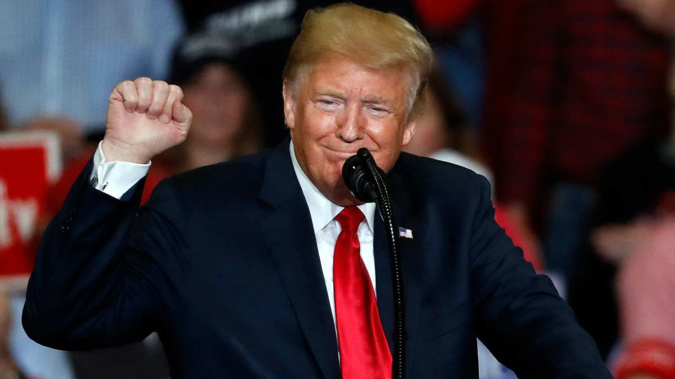
America's midterm elections are just hours away, and the media is saturated with analysis of what they will mean for Donald Trump.
Midterm elections are the general elections held in November every four years, near the midpoint (midterm) of a president's four-year term of office.
Today is being billed as a national referendum on Trump's performance after two years as President.
What are the Midterms?
Like the stack of weird and disturbing toppings on a hot dog at the baseball, America's system of government is maddeningly complex.
It is split into three branches, each designed to be a check on the other's power:
• The Executive Branch: Trump and the various agencies he controls directly;
• The Legislative Branch: Congress. Like our own parliament, it is divided into the House of Representatives and Senate;
• The Judicial Branch: The Supreme Court.
Every four years, about halfway through the president's time in office, the midterms are held, putting the entire House and a third of the Senate up for re-election.
What today means for Trump
If today's midterms go badly for Trump, and his Republican party loses control of the House of Representatives, he will be left in a deeply uncomfortable position, unable to pass legislation without help from his political opponents.
Trump's Republican Party currently controls both chambers. In these midterms, both could theoretically fall to the Democrats, though the Senate is very much a long shot.
Even if the Republicans only lose the House, however, it will leave Trump unable to pass legislation without his bitter enemies' help.
Should Democrats win control of the House, as strategists in both parties suggest is likely, they could derail Trump's legislative agenda for the next two years. Perhaps more important, they would win subpoena power to investigate Trump's many personal and professional missteps.
But what if that doesn't happen? What if Trump's Republicans do surprisingly well, and the Democrats fall short of taking back the House?
The Daily Beast has examined that "unthinkable" scenario in some depth. It reports that failure in the midterms could plunge the Democrats into an "utter and complete psychological meltdown".
"After all this work, all these volunteers, it would be absolutely shattering," Democratic strategist Paul Begala told the website.
"I can't even contemplate it, it would be so indescribable," said former Congressman Steve Israel.
There is no contingency plan. No attempt to prepare for the potential disaster. Trump's enemies are gambling everything on winning.
The nightmare scenario
The Democrats need to take 23 seats from the Republicans to win control of the House, and if the polls are any guide, they should succeed.
The predictive model at FiveThirtyEight currently projects an 88 per cent chance of them winning the seats required.
A late CNN poll shows the Democrats leading a generic ballot 55-42 thanks to a surge in support from women, independents and minority voters.
Trump doesn't think much of that poll.
And there is no guarantee the polls are correct. It all depends on how accurately they have predicted voter turnout.
"Because America has voluntary voting, not like Australia's compulsory voting, a lot more of it involves convincing your side to turn out and vote, rather than convincing undecided voters in the centre to support you," Dr Shaun Ratcliff from the US Studies Centre told news.com.au.
It makes these midterm elections extremely hard to predict.
Donald Trump is an extraordinarily polarising person. He energises elements of the Republican base, who love him, and the Democrats, who hate him, at the same time.
That is reflected in the early vote totals for these midterms, which are high. Very high. In several states, there have been more early votes this year than there were total votes last time, in 2014.
"Democratic voters are usually less likely to turn out," Ratcliff said.
"They're generally lower income, younger or minority voters, and are often people with fewer resources who can't afford to go out on Tuesday to vote."
With that in mind, unusually high voter turnout could be a good sign for them.
But winning the popular vote will not necessarily be enough — just ask Hillary Clinton, who beat Trump by almost three million votes but still lost the 2016 election.
Ratcliff said the Democrats would need a majority of "at least 6 per cent".
What if their nightmare comes true again? What if all the pollsters and pundits have missed a surge of silent Trump supporters?
'Apocalyptic for the country'
The Democrats went through a mild identity crisis in 2016, as Clinton struggled to hold off a surprisingly stubborn challenge from left-wing Senator Bernie Sanders in the fight for the party's presidential nomination.
Sanders offered a less restrained version of progressivism, which resonated with millions of Democratic voters. In the wake of Clinton's defeat to Trump, some wondered whether he could have won in her place.
Take your Radio, Podcasts and Music with you

/arc-anglerfish-syd-prod-nzme.s3.amazonaws.com/public/MPOTX37JCFCG7MIU777DSIVYIE.jpg)






